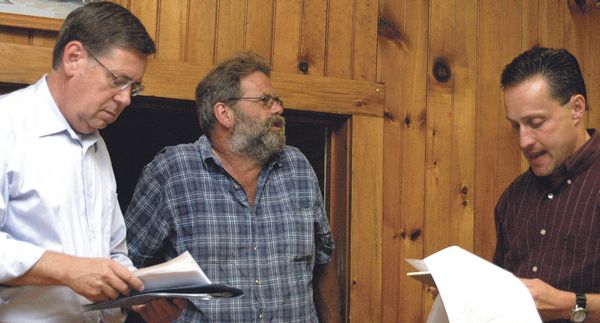Subscriptions
Menu
Advertisements
Dairy hopes to tap state's stimulus $
7/28/2009 |
By Patsy Nicosia |

It’s at best a long-shot but Assemblyman Pete Lopez and Senator Jim Seward told dairy farmers Thursday they want to try to tap into $1 billion in state federal stimulus money to help them through the worst economic times most of them have ever seen.
About 65 farmers and agribusinessmen crowded the Lawyersville Church Hall for the Emergency Dairy Summit, where speaker after speaker said there’s not a moment to lose.
“We don’t have a lot of time to play footsie,” said Assemblyman Lopez.
“If we wait a year or longer for formal policy changes, a lot of you guys won’t be there.”
No one needed any convincing.
Mr. Radliff said all projections are that it will be the middle of 2010 before the economy turns around and blasted the Obama Administration for using dairy for “horsetrading for the war in Iraq.”
Carlisle dairyman Art Graulich pointed out most of the other Northeast states have allocated emergency money for short-term help, but with the state of New York’s budget, that doesn’t seem likely here.
Federal legislation is looking at expanding the emergency MILC program, which pays farmers when the price they’re getting for their milk drops below a certain level.
But all agreed that would come too late for most of them.
And that’s the best reason for tapping into the economic stimulus money, said Senator Seward.
“I can’t think of a better way to stimulate the economy than getting that money out and flowing to New York’s dairy farms,” he said.
“Pete and I can get the ball rolling…”
One of the questions both had, however, is how much is enough.
When milk prices plummeted in 2006, the state okayed $30 million in emergency assistance after being asked for $60 million.
“What is the number?” asked Assemblyman Lopez.
“Triple it,” said Mr. Radliff.
Dairyman John Stanton said he’s losing $20,000 a month; estimates he’s read said it’s $100 a cow.
Mr. Graulich said Massachusetts is spending $94 million to help its farmers; Senator Seward said maybe then they should shoot for $94-$100 million.”
Wes Ostrander, an agribusinessman from Randall Implement in Fultonville, spoke passionately about the impact the crisis is going to have on things like property and school taxes.
Julie Suarez, director of public policy for the state Farm Bureau, urged the crowd to keep the momentum going—no matter what happens in the short-term.
“You need to reach out to dairy farmers in other states,” she said. “You have to change the federal marketing system.”
Assemblyman Lopez said farmers also need to find a way to better work with consumer groups over concerns about the safety and security of the imported food they’re competing with.
“Even the far left is starting to say, ‘We value local agriculture,’’ he said. “To me, that’s the angle.”
Dairymen and legislators also called for an investigation into allegations of price gouging
But first things first.
Assemblyman Lopez said he and Senator Seward need to find out whether the state’s federal stimulus money—for use at Governor Paterson’s discretion—is still there and how to access it.
He said they also need to “work across the aisle,” which he believes can be done.
When asked how soon the money might be available—if it’s available—Senator Seward said he thinks the fall is “do or die time.”
Still, it won’t come easy, cautioned Assemblyman Lopez—another reason why time is of the essence.
“At some point, there’s going to be a clash with processors,” he said. “The question is what we can get done before that happens.”









